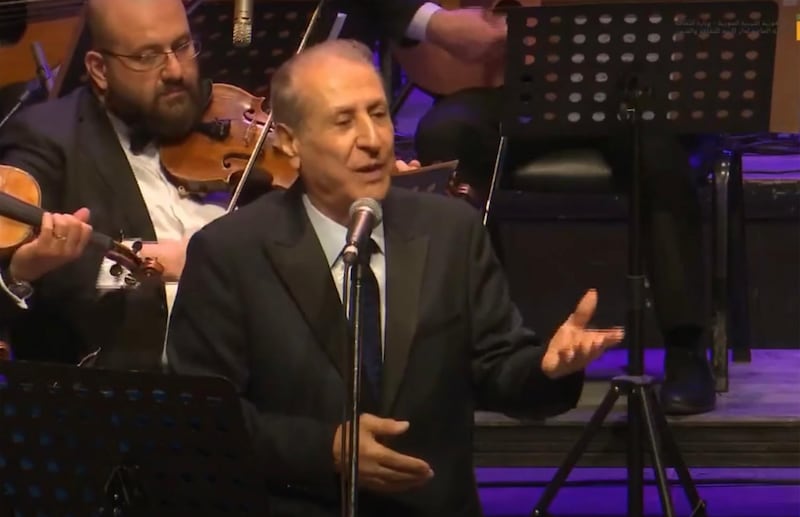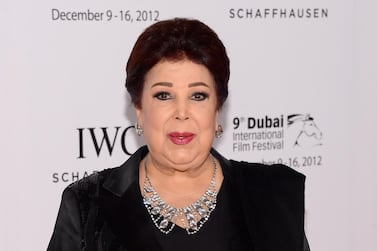Lebanese singer Marwan Mahfouz has died of complications due to Covid-19, at the age of 78.
The veteran performer died in hospital in the Syrian capital Damascus on Saturday, after being admitted last week with a fever and shortness of breath.
The death was announced through the Syrian press agency Sana.
Mahfouz had been living in Damascus for a month, having arrived in the city to perform a sold-out, and live-streamed, concert at the Damascus Opera House on June 23.
Accepting an invitation by the Syrian Ministry of Culture, Mahfouz elected to remain in the capital amid the pandemic, until it was safe to return to Lebanon.
The Syrian Ministry of Culture released a statement on its Facebook page, mourning the loss of Mahfouz.
“The great Lebanese artist Marwan Mahfouz died on the land of a country he loved and sang for,” the statement reads. “Coronavirus has managed to betray him despite the care and attention surrounding him. The ministry of culture extends its sincere condolences to the family and friends of Marwan Mahfouz and confirms that his sad departure is a painful blow to real art. He will leave behind an irreplaceable gap and the name of Marwan Mahfouz will live for ever when it comes to authentic Arabic music.”
Mahfouz was also remembered in his homeland with pop star Najwa Karam leading tributes from scores of Lebanese cultural personalities.
"God have mercy on the soul of artist Marwan Mahfouz," Karam posted on her social media accounts.
الله يرحم روح الفنّان #مروان_محفوظ
— Najwa Karam (@najwakaram) July 25, 2020
وانشاالله تكون نفسو بالسما يا ربّ 🙏🏼
Documentary filmmaker and journalist Firas Hatoum paid tribute to the artist whom he felt was underappreciated in Lebanon. "And we are shocked to discover that all the Lebanese people know and love Marwan Mahfouz?" he said on Twitter. "For 20 years this person did concerts in Syria because if he had performed a concert in Lebanon, maybe you wouldn't find 50 people.”
وهلق اكتشفنا انو كل الشعب اللبناني بيعرف وبحب #مروان_محفوظ وهوي الزلمي كان الو عشرين سنة عم يعمل حفلات بسورية لأنو لو عمل حفلة بلبنان يمكن ما كان لاقى خمسين بني ادم يحضروه!! #لبنان #كورونا_لبنان #كورونا
— Firas Hatoum (@ferashatoum) July 26, 2020
Mahfouz is one of a growing list of regional cultural personalities to have died from health complications related to the coronavirus. They include Saudi Arabian singer Saad Al Tamimi, who died aged 93 on July 16, and Egyptian actress Ragaa Al Geddawy who died on July 5 at the age of 81. On July 21, Saudi Arabian singer Waed revealed her 20-year-old daughter, Hossna, tested positive for Covid-19.
While Mahfouz might not have been a blockbuster name, his six-decade contribution to the Lebanese artistic landscape is indisputable. His death is especially resonant as he was one of the few remaining artists, along with Fairuz, 84, whose career links back to what many view as the golden age of Lebanese music and stage – a period between the mid-1950s and 1970s. It was a period full of influential figures, such as the late Wadih al-Safi, Sabah and brothers Assi and Mansour Rahbani.
From supporting roles to a solo career
Mahfouz was born in the city of Zahle, east of Beirut, and moved to the Lebanese capital in his early twenties to study Arabic vocalism in a conservatory.
He landed his industry break in 1965, after The Rahbani Brothers spotted his television debut on the talent show Hiwayat.
The duo were impressed by Mahfouz's performance of al-Safi's Tal Al Sabah, and his rich tenor and technique. They promptly signed him up to perform in their 1965 Baalbeck Festival musical stage production Dawaleeb Al Hawa, alongside star Nasri Shamseddine and then up-and-coming artist Sabah.
This was the beginning of an eight-year partnership (1965 to 1973) with The Rahbani Brothers, which included supporting roles in seminal musical plays such as 1967's Ayam Fakhr Al Deen (starring Fairuz) and 1969's Al Shakhs. Both were performed at key Lebanese cultural events including the Baalbeck, Beiteddine and Cedars festivals.
It was in 1973's musical Sahriya, written by Ziad Rahbani, that Mahfouz came into his own as a performer. He played the co-leading role of a struggling musician, alongside star Georgette Sayegh, and critics raved about his performance, particularly his takes on a string of now Lebanese stage standards, including Ya Saif El Al Aada Tayel and Khayif Koun Ashqatik wa Habibatik.
For the next four decades, Mahfouz focused on his solo career, having produced dozens of albums filled with songs written by some of the most esteemed Lebanese composers and poets including, Abdel Jalil Wehbe and Botros Dib, as well as covers by El Safi and Melhem Barakat.
On the shoulders of giants
While it can be argued that Mahfouz didn’t get the acclaim he deserved in his homeland, the man himself didn’t seem to mind.
In one of his last interviews with Syria's Al Madina FM in March, he said working with the giants of Lebanese music over the course of his career gave him the most satisfaction.
"There is no doubt that I am lucky. It is nothing short of a blessing to be born in a time full of great people who heard you and encouraged you to keep going,” he said. “I realise that I have never performed or worked with a person whom I didn’t love or they loved me. When you work in such an environment then the music comes from the heart. And what comes from the heart reaches the heart.”







